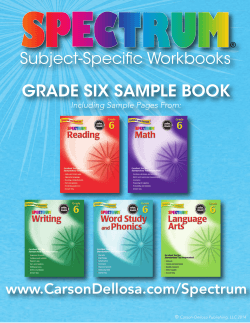
“A Rose for Emily” By William Faulkner Howard College, Big Springs, TX
“A Rose for Emily” By William Faulkner Written and developed by Mrs. Carol Hanes, Howard College, Big Springs, TX http://www.howardcollege.edu/homepages/chanes/engl_1 302_tth.htm Climax Resolution PLOT Exposition Exposition: 1. Initial equilibrium 2. complication (Homer) 3. Setting -Small town -South -late 1800s, early 1900s -Miss Emily’s house 3. Characterization (What are the characters like? Protagonist/Antagonist? Flat/Round? Static/Dynamic? Stock?) -Miss Emily Grierson -Miss Emily’s father -Homer Barron -townspeople -the Negro -the cousins Conflict ( Man vs. Man; Man vs. Himself; Man vs. Nature; Man vs. Society; Man vs. Supernatural ) -Miss Emily vs. her father -Miss Emily vs. herself -Miss Emily vs. Homer -Miss Emily vs. townspeople/cousins •Climax (The point of the story where the main conflict is resolved.) -Miss Emily dies. •Resolution (What does the reader learn after the climax?) The room is opened. Homer’s body is discovered. The townspeople put all the clues together. – What is the “rose” for Emily? POINT OF VIEW 1) 1st person Character (major/minor? participant? reliable?) 2) 3rd person Narrator (omniscient/limited/objective) • “When Miss Emily died, our whole town went to her funeral. . . .” -First person minor character, participant, unreliable TONE • Conversational, gossipy. • Mysterious • Bizarre, strange • Grotesque • Southern Gothic STYLE (The way the author tells the story.) Long, complicated sentences. (See ¶ 1) -interruptions -big, bookish words (coquettish, ¶ 2) • Lots of description. (See ¶ 6) • Flashbacks. (See ¶ 3) • Not much dialog. THEME (What general idea or insight does the entire story reveal? Must be stated in general words & must apply to society in general and not just this story. May not state what the story is about.) • People may resort to desperate measures to prevent being alone in life. • Things, people, and events are not always what they appear to be. • Others? SYMBOL (An object that suggests more than its literal meaning. An object that points or hints at deeper meaning. Always look at titles, inanimate objects, names, colors, and locales.) •The rose color? •The title? •The toiletry items? •The pocket watch? •The dust? CRITIQUES • The plot’s order and time frame • Southern Gothic genre • Her father’s influence – his repression leads her to date a man he would not approve of and then take control in the only manner possible • Necrophilia – she loved and slept with the dead. In what ways? • Passage of time – Emily’s denial of it
© Copyright 2025





















